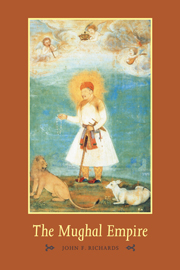Book contents
- Frontmatter
- Contents
- List of maps and tables
- General editor's preface
- Preface
- Introduction
- 1 Conquest and stability
- 2 The new empire
- 3 Autocratic centralism
- 4 Land revenue and rural society
- 5 Jahangir 1605–1627
- 6 Shah Jahan 1628–1658
- 7 The War of Succession
- 8 Imperial expansion under Aurangzeb 1658–1689
- 9 The economy, societal change, and international trade
- 10 Maratha insurgency and Mughal conquest in the Deccan
- 11 The Deccan Wars
- 12 Imperial decline and collapse, 1707–1720
- Conclusion
- Glossary
- Bibliographic essay
- Index
- THE NEW CAMBRIDGE HISTORY OF INDIA
4 - Land revenue and rural society
Published online by Cambridge University Press: 28 March 2012
- Frontmatter
- Contents
- List of maps and tables
- General editor's preface
- Preface
- Introduction
- 1 Conquest and stability
- 2 The new empire
- 3 Autocratic centralism
- 4 Land revenue and rural society
- 5 Jahangir 1605–1627
- 6 Shah Jahan 1628–1658
- 7 The War of Succession
- 8 Imperial expansion under Aurangzeb 1658–1689
- 9 The economy, societal change, and international trade
- 10 Maratha insurgency and Mughal conquest in the Deccan
- 11 The Deccan Wars
- 12 Imperial decline and collapse, 1707–1720
- Conclusion
- Glossary
- Bibliographic essay
- Index
- THE NEW CAMBRIDGE HISTORY OF INDIA
Summary
Despite centuries of Muslim dominance in the Indo-Gangetic plain, Akbar's officials found consolidation of state power incomplete. In the second half of the sixteenth century both force and diplomacy were needed to subdue and pacify rural society. Even within the zone of direct administration, in the most fertile hinterlands of the towns, supposedly inhabited by subjects regulated by a tax system, the Mughals confronted only partially subdued local polities. In more distant regions were barely tributary areas that had been recently settled and colonized by Hindu and Muslim armed warrior-pioneers. Extension of centralized administrative control over these areas would be unprecedented.
In one pargana after another armed, potentially hostile, warrior lineages–Rajputs, Jats, and other locally rooted caste elites – ruled the cultivating peasantry. These local aristocratic lineages and their lineage heads or chiefs dominated individual parganas, or segments of parganas by virtue of conquest, migration and colonization. Parganas in the north were miniature kingdoms containing from as few as twenty to as many as two hundred contiguous villages. These were the primary building blocks of political control in Indian rural society – not individual villages.
Local elites had performed a key role in organizing, financing, and leading peasant-cultivators in a process of jungle-clearing and settlement. Often this expansion required armed battle with indigenous “tribals” or non-Hindu groups who cultivated and settled much less intensively than the newcomers.
- Type
- Chapter
- Information
- The Mughal Empire , pp. 79 - 93Publisher: Cambridge University PressPrint publication year: 1993

